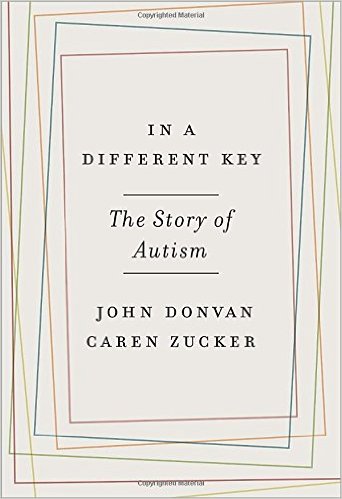 As a lover of book reviews, I take notice when a new book is gathering the media spotlight. In a Different Key: The Story of Autism led the thick book review section in the latest Oprah magazine, it’s showed up in several articles received in my email inbox, and I’ve caught sight of the title many times while surfing the World Wide Web. I knew I wanted to interview one of the authors when I read that the book was about the “extraordinary story of this often misunderstood condition, and of the civil rights battles waged by the families of those who have it." Caren Zucker is a Peabody-award winning television news journalist who works for ABC News and a producer and co-writer of the six-part PBS series Autism Now. John Donvan is a multiple Emmy Award-winning correspondent for ABC News. On Feb. 9, they spoke at Town Hall in Seattle; the title of their talk was Unpacking the Mysteries of Autism.
As a lover of book reviews, I take notice when a new book is gathering the media spotlight. In a Different Key: The Story of Autism led the thick book review section in the latest Oprah magazine, it’s showed up in several articles received in my email inbox, and I’ve caught sight of the title many times while surfing the World Wide Web. I knew I wanted to interview one of the authors when I read that the book was about the “extraordinary story of this often misunderstood condition, and of the civil rights battles waged by the families of those who have it." Caren Zucker is a Peabody-award winning television news journalist who works for ABC News and a producer and co-writer of the six-part PBS series Autism Now. John Donvan is a multiple Emmy Award-winning correspondent for ABC News. On Feb. 9, they spoke at Town Hall in Seattle; the title of their talk was Unpacking the Mysteries of Autism.
Caren Zucker graciously answered the questions below for ParentMap readers.
Q: At 552 pages, In a Different Key first appears to be a daunting read. But, I was struck by how you’ve made this history of autism a very up-close and personal tale, which makes it a captivating read. How did you go about writing this book? How much time did you spend with the families profiled and what was it like to talk at such an in-depth level? How long did it take you to research and write it?
A: Well, we wanted the pages to fly by for the reader so that is why we kept the chapters very short, and kept the stories moving along through the stunning twists and turns which first captivated us about autism’s little-known history. The way we tell the story is dramatic and moving, but it is also the reality of what happened over many decades to people with autism and their families. Everything is documented.
We found it liberating to be able to spend hours, or days, or even weeks getting to know and profile people with autism and their families; in our news reporting we never had the luxury of getting so deep into other peoples lives. We worked on the book for over seven years
Q: Why did you decide to write such a comprehensive history of autism?
A: We both have personal connections to autism. John’s brother in-law is severely affected by autism, and Caren and has a 21-year-old son with autism. As a correspondent and producer team at ABC News we began producing stories for ABC News in the year 2000, wanting to educate people about autism at a time when no other network was covering the topic. We had been covering autism for half a dozen years when we decided we needed to create something enduring. We thought the best way to look forward to the future was to take a detailed look at the past. There wasn’t a single "aha" moment, but an evolution. Some of the major trends and developments we covered in our book we had reported as they were happening.
The family point of view is one lens that we used but it was not the only one; researchers, educators, lawyers, self-advocates, scientists and many others make up In a Different Key.

Q: Every person has a different story about how they learned of autism, and I’m sure many of these stories contain misconceptions. What is the biggest misconception about autism that you hope the book rectifies?
A: The words fear and autism should never go together when all too often they have. That’s why children with autism, at one time, were put away in institutions for life; that’s why adults with autism today still face prejudice, with some communities still fighting to keep adults with autism out of their neighborhoods.
We hope that people learn through our book that there are many communities who can and do embrace people with autism. We need that to be the norm, not the exception.
Q: There’s so much in the media stream about autism these days. What is one story from the book that you’d love the average American to know, to help them understand an important facet of autism?
A: Near the end of the book we tell a story about a young man with autism being bullied on a bus because he was making loud sounds and rocking in his seat. When that happened, another passenger on the bus stood up in his defense. After that, the entire busload of passengers came over to the young man's side, and made the bullies back off. We think the message there is obvious and is the essence of what we want people to embrace from our book.
Q: You’ll be speaking in Seattle on Feb. 9. What are your talks like? What can audience members expect to hear about in your talk? I’d love a snapshot preview of the event.
A: We tell wonderful stories — not always happy, but always important — to inspire an audience that may not know much about autism to connect with and care about people who live with it, the challenges they face and the humanity they represent.











